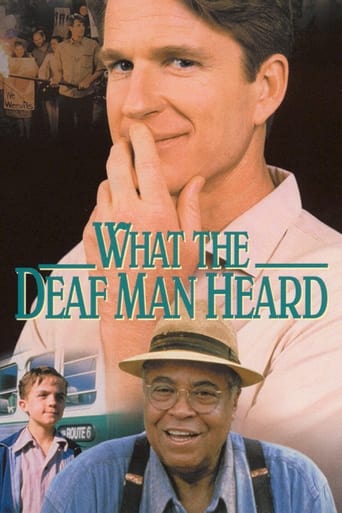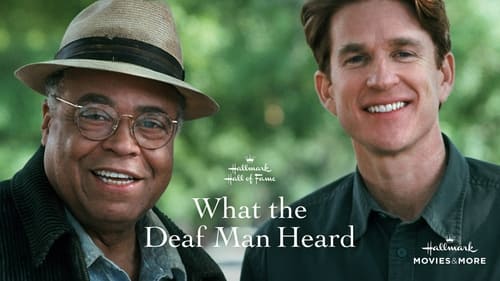KnotStronger
This is a must-see and one of the best documentaries - and films - of this year.
Lollivan
It's the kind of movie you'll want to see a second time with someone who hasn't seen it yet, to remember what it was like to watch it for the first time.
Myron Clemons
A film of deceptively outspoken contemporary relevance, this is cinema at its most alert, alarming and alive.
Ariella Broughton
It is neither dumb nor smart enough to be fun, and spends way too much time with its boring human characters.
q_leo_rahman
Hallmark's Hall of Fame is noted for making television films since the 1950s, featuring high-profile celebrities and a wide variety of stories. This particular TV film is considered one of their best, and it's not too hard to see why. There is something unique about this tale, not just its story but in its very execution, something that would be hard to see nowadays. Based on a novel by GD Gearino, this TV film tells the tale of a boy, Sammy Ayers, who arrives in a new town all by himself. People mistake him for being deaf and dumb, so he goes along with this assumption for about two decades. Such a premise would serve as a ground for tense drama and thrills at the revelation of dark and horrible secrets, but that's not where the story leads. Instead it portrays a slice of life within the small-town community, and Sammy serves as silent confidant throughout the years, earning reliability and confidence from the townspeople. He doesn't really get a chance to reveal his true ability until he gets involved in a scam that almost causes a lot of ruin to the town.The premise of maintaining a facade of deafness for two decades is unusual, but not impossible. Superman has been hiding behind the glasses and clothes of Clark Kent for most of his life and that went down more or less successfully. And it also helps that the person in particular is a stranger and later resident at a small American town in the 1940s-60s, when things were quieter and friendlier and more uncomplicated. Superman's America, to go back to the previous analogy: the American county country, where people were decent and honest and content. That's the main strength and appeal of this piece: it is a love letter to gentler easygoing times, when people were more or less fundamentally good. There isn't anything too horrible or bad to this story: the worst that happens is the loss of Sammy's mother and a church getting burnt down from a scam. The antagonist isn't antagonistic himself, he's just a spoiled rich boy denied his inheritance and trying to con people. That may put people off as unrealistic or underdeveloped, but in today's workaholic "rat race" era such an ambiance and setting would definitely be a welcome change or desire.The performances themselves are solid and dependable. Matthew Modine stands out as the title character who stays hush, letting his face and gestures do the talking. The supporting cast do their roles justice and give dependable performances, but a clear scene-stealer would be the inimitable James Earl Jones as Archibald Thacker, the sly trader who gets wind of Sammy's secret but sees he hasn't said anything so keeps his mouth shut too.Overall, it's a nice little story. It's not really anything deep or ponderous, but just a simple feel-good folktale set amidst the golden fields of America. And sometimes that's where we need to go for a good time and a solid rest.
henryevans-1
I thought the mix of humour, satire and sentiment was just right. It is also a commentary (subtly) on how hearing impaired people are treated by society. Seeing the crooked and self serving get some just desserts was rewarding, and the final twist, engineered by a loving father figure for the one he effectively adopted, was both surprising and heart-warming. The acting was good (if not Oscar-winning) and the plot line written with sufficient complexity as to keep you wondering what would happen and how the pieces of the story linked together. The time setting of the story was a bit hard to guess at first but markers soon appeared to help the viewer. The clever change of name of a well known pop group raised a smile and perhaps the reactions of some to that group were a bit over the top, but not out of keeping entirely with the hysteria of the time.
TxMike
This movie starts in the 1940s, then after the establishing scenes mostly takes place in the 1960s. It examines the situation, what would people do and say if they thought no one was listening? It creates interesting outcomes. A worthwhile movie.SPOILERS are contained in all the rest of my comments. Matthew Modine plays grown up Sammy Ayers, who had been left alone as a child on a bus after his mother Helen (Bernadette Peters) stepped off at a rest stop to buy a soft drink. She was dragged off and killed, while the bus driver simply thought she abandoned her son. When Sammy arrived the next morning at the destination, and found his mother missing, he did not immediately talk, all the townspeople believed he was deaf and mute, and he played the part because it was convenient. He grew up that way, and was treated as inferior by some, became the town handiman, picked up chore slips each day from a box at the store. James Earl Jones plays Archibald Thacker, a junk hauler along with his sons, but secretly running illegal moonshine, and getting rich in the process. The big 'secret' of this story is not revealed until the end, but Sammy was born out of wedlock and his father was the rich man of the town, and in his will left his inheritance to his eldest son, Sammy. The other son was dishonest, embezzled money from the local church. Sammy spoke the first time during the trial, as he had witnessed the plans and transgressions of the bad son. The 'daughter' was actually adopted and, since she and Sammy never did live as siblings, we see as the movie ends she and Sammy are on a bus together, heading somewhere to start new lives. There is s small element of 'revenge' here. The bad son had always treated Sammy badly, and made fun of him. So, Sammy's testimony which led to the conviction took on a type of revenge. But it was not revenge in the sense that Sammy actually did something to get back. He simply obeyed the law and testified. As opposed to 'Dogville' in which revenge is specific and willful, and equally unlawful as were the acts which sparked her revenge.
John Gilmore (junction1066)
All you have to do is sit back and observe what is going on in the town and you can identify with Sammy and get in on the plots going on around him. His faking it is a great deal more believable than much of what is on the tube these days. Quit trying to make more of it than was meant.


